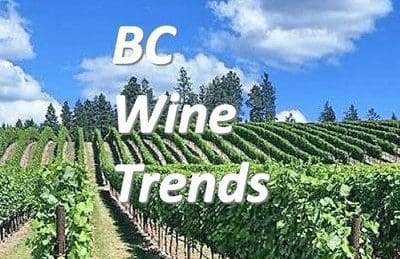It was a sold-out crowd for the Sensory Symposium held last weekend at Okanagan College in Penticton. The event attracted a wide range of BC Wine drinkers. A special thank you to Laura Milnes of SILK + COUPE for the press pass and the excellent job moderating the panel discussions. Below is a brief summary of the highlights from the day.
First, a thank you for the winemakers that took time from their busy schedules to participate on the panels.
The Winemaker Panel
- Costa Gavaris, Rigour and Whimsy
- Kelsey Rufiange, Echo Bay Vineyard
- Graham O’Rourke, Tightrope Winery
- Mireille Sauve, Dames Wines
- Rob Summers, Hester Creek Estate Winery
- Charlie Baessler, Corcelettes Estate Winery
- Michal Mosny, Winemaker’s CUT
- Alison Moyes, Liquidity Wines
- Severine Pinte, Le Vieux Pin Winery / La Stella Winery
Session 1 – Women in Wine
The first flight highlighted the winemaking talents of Alison Moyes, Severine Pinte, Kelsey Rufiange and Mireille Sauve shown below.

I had the opportunity to compare notes with Andrew, a vineyard worker at Arrowleaf Cellars in Lake Country visiting from Korea.
All four wines were excellent examples of what BC Wine Country can deliver. An 80% Pinot Blanc blend from Dames Wines with a magic floral aroma. An elegant Pinot Noir exhibiting black fruit, lightly oaked with hints of chocolate from Liquidity Wines. A bold black fruit Merlot dominant blend from Echo Bay Vineyard. A very dry Syrah bursting with Red bramble fruits from Le Vieux Pin.

After reviewing the flight, the panel discussed the difference between women and men in the wine cellar. As a generalization, women have a tendency to concentrate on the minute details of the winemaking process whereas men focus more on the “big picture”. There seemed to be a consensus that the optimum cellar team is a combination of women and men.
Sam Hauck had a great suggestion that the women winemakers should start a winemaker’s support group to help the less experienced woman winemakers in the industry.
There are so many other female BC winemakers that could help the newbies. Ann Sperling, Kathy Malone, Val Tait, Jacq Kemp, Simone Ardiel, Caroline Schaller, Corrie Krehbiel, Lyndsay O’Rourke and Jaime Flemke to name just a few. My apologies to those I have missed. Looking at this list I have the feeling that the ladies underestimate their power and influence within the BC wine industry.
Session 2 – Natural Wine

The panellist reviewed the second flight which contained both natural and conventional wines. One of the natural wines was Costa Gavaris’s Pinot Blanc, which was fermented on the skins for two months and aged in barrel for 15 months. The wine is intensely fruity, with flavours of apple, quince and pear. The texture is rich and the finish is quite long.
Making Natural Wines can be challenging. Some natural wines are prone to problems like stuck fermentations (common with some yeast strains), oxidation, funky aromas. A major part of the panel discussion focussed on the use of Sulphites in wine.
Severine told a story about how she had made a natural white wine that resulted in sulphite levels of around 20 PPM. Normally she would have added sulphites after fermentation to preserve the wine but decided to stay with natural wine practices and added no sulphites before bottling. The wine tasted phenomenal when released. Six months or so later she attended a winemaker’s dinner where the wine was served. To her surprise, the wine was now badly oxidized when opened. This is one of the challenges of natural wines!
Session 3 – Sustainability and sensory diversity in BC

The term “sustainable” is commonly used by farmers and vintners to encompass steps they are taking to assure that their businesses become and remain environmentally, economically and socially viable.
Graham O’Rourke was a committee member writing guidelines for the vineyard portion of the Sustainable Winegrowing BC program, developed by the BC Wine Grape Council.
SWBC is founded on three sustainability principles:
- Sustainability is a journey of continual improvement, not a destination;
- Sustainability must be assessed over time; and
- Sustainability outcomes can be achieved through different pathways.
Michal discussed how in his homeland of Slovenia winemakers predominantly practice sustainability as their vineyards are usually handed down from one generation to the next.
Rob commented on how water conservation was key to Hester Creek’s Sustainability practices. Due to the high water usage in winemaking, significant use is made of recycled water. The vineyards use only drip irrigation.
If you attended the Symposium I would love to hear your comments.
